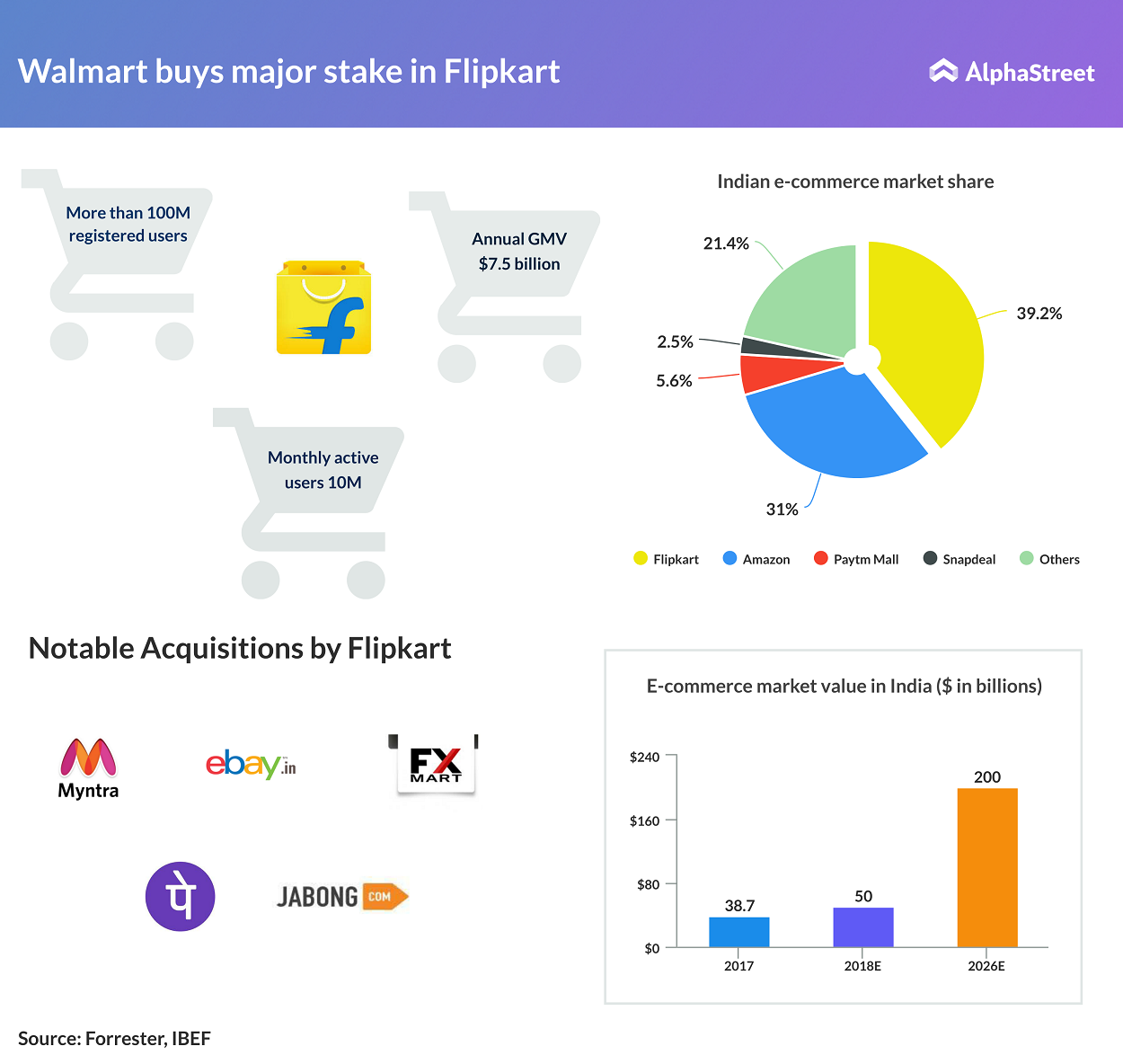Supermarket veteran Walmart started its full-scale invasion into the cutthroat Indian e-commerce market, as it announced buying a majority stock in Bengaluru-based Flipkart Group. The Arkansas-headquartered US giant will pay about $16 billion for at least 77% percent stake in Flipkart, according to an SEC filing. However, shareholders of Walmart seem unimpressed by this huge step Eastward — sending the stock down by almost 5% in pre-market trade on Wednesday.
The rest of the Indian e-commerce player will be held by Flipkart’s existing shareholders — Flipkart co-founder Binny Bansal, Tencent Holdings Limited, Tiger Global Management LLC and Microsoft Corp. According to the joint announcement, Walmart supports “Flipkart’s ambition to transition into a publicly-listed, majority-owned subsidiary in the future.”
Walmart joins an eclectic board
Walmart plans to invest $2 billion of new equity funding in helping Flipkart achieve long-term goals, while also holding discussions with additional potential investors to join the round. This might result in Walmart’s investment stake being lower after the transaction is complete.
Even so, the US giant would still retain majority ownership, with Tencent and Tiger Global continuing on the Flipkart board — joined by new Walmart members. The deal is expected to close later this calendar year, subject to regulatory approval, especially from Indian watchdogs.
To finance the transaction, Walmart intends to use a combination of newly issued debt and cash-on-hand. Upon closing, Flipkart’s financials will be reported as part of Walmart’s International business segment.
If the transaction were to close at the end of the second quarter this financial year, Walmart expects a negative impact of about $0.25 to $0.30 per share to earnings of fiscal 2019, including an incremental interest expense related to the investment.
India’s blockbuster startup
Founded in 2007, Flipkart ushered in the e-commerce revolution in India. While eBay was present, it acted more like a seconds’ market attracting very few vendors. Flipkart got the right start as it aimed the educated youngsters with books as its primary product. The Bengaluru-based startup quickly bloomed into a brand, earning trust from its customers through a very robust technology foundation.
Soon, it became the leader in electronics, large appliances, mobile phones, fashion, and apparel. Flipkart also goes toe-to-toe with the Indian arm of Amazon, emerging as their top (and maybe the only worthy) competitor. In a local market with multiple payment systems such as PayTM and PhonePe that give Paypal a run for its money, many more platforms emerged — Myntra, Jabong and the like. But Flipkart was able to uniquely position themselves with continued evolution, aping how Amazon is in the US.
According to the Flipkart, its own supply chain arm eKart serves more than 800 cities, clocking in an average 500,000 deliveries a day.
With this deal, Walmart will bring to the table grocery and general merchandise supply-chain knowledge and financial strength, and by the looks of it, Flipkart will make the most of the union to grow into a listable giant quickly.
Currently, Walmart’s Indian arm runs one fulfillment center and 21 Best Price cash-and-carry stores in 19 cities across nine states in the Asian country, with more than 95 percent of sourcing coming from India. This union also seems to help Walmart bolster its India operations and possibly, further add to the on-the-ground stores. And moreover, it will help bolster the US giant’s international stand against rival Amazon Inc (AMZN).
Of late, Flipkart came under flak from several customers as allegations of artificially inflating the listed price and then giving sharp discounts on it, allegedly duping buyers. While e-commerce is an industry that is well under the scrutiny of Indians, Walmart’s new eagle eye on operations might help lift the successful startup to new heights.
